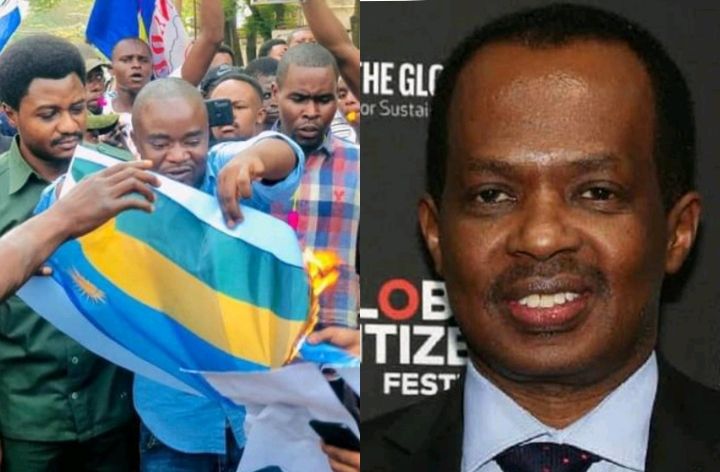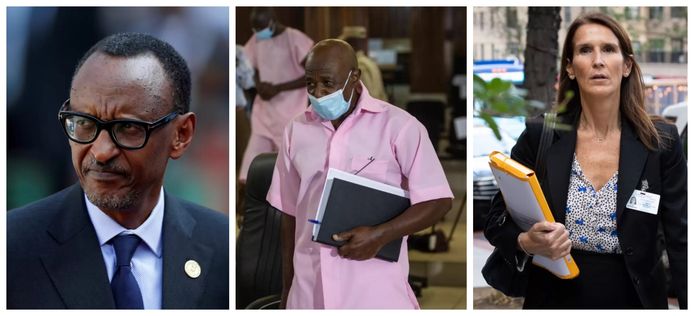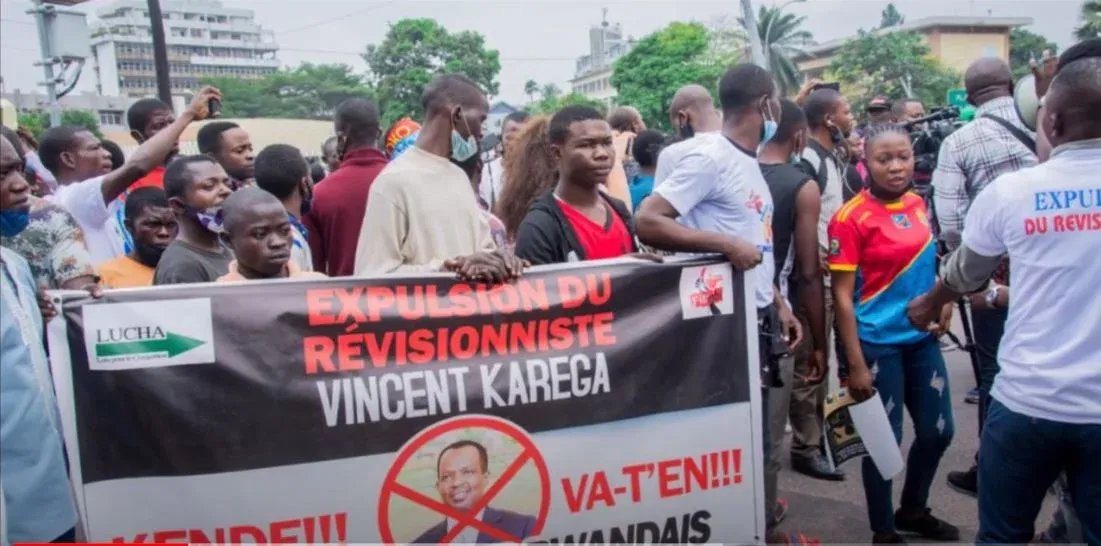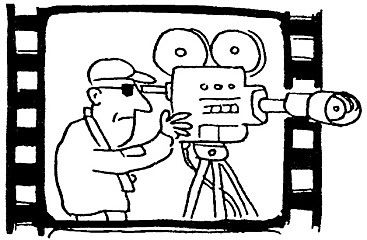Brussels shoots itself in the foot by blocking the accreditation of a new Rwandan ambassador

Belgium refused to accredit Vincent Karega as the new Rwandan ambassador in Brussels. Local Rwandan newspapers already wrote lengthy articles about this. For some this decision comes as a surprise, for others it is only the result of a long process of bad diplomacy, misunderstanding and manipulation. The relationship between Belgium and Rwanda was already very bad a couple of years ago when Belgium recalled its military attaché and its first secretary of the Belgian embassy in Kigali. The new diplomatic crew that stepped in tried to mend these problems and the new Belgian ambassador proved ten times more efficient than his predecessor. Their efforts proved largely to be in vain with the decision of their bosses in Brussels to block Vincent Karega. We’ll try to analyze what went wrong and we talked to several people about this: their opinions vary, but they are all convinced of one thing: Belgium has lost its touch with this region and it was incapable to shred off completely its colonial reputation and attitude.
What we cannot understand well is the fact that the Belgian ministry of foreign affairs did not give a specific reason why he blocked this accreditation and this is another sign of their weakness. A Rwandan newspaper saw two possible reasons for this decision: the fact that Vincent Karega was ambassador in South-Africa several years ago when the Rwandan renegade general Kayumba was attacked there. Another reason that was advanced was the fact that Karega was the last Rwandan ambassador in the DRC before the Tshisekedi government expelled him. Brussels already refused the accreditation of another Rwandan diplomat a couple of years ago who served under Karega in South-Africa when Kayumba was attacked. Concrete evidence that both diplomats were involved in the planning of this attack was never given. Last year Karega was expelled from Kinshasa when the Congolese government started accusing Rwanda to have send troops into the DRC to back up the M23 rebel group. This made Karega probably the best known Rwandan ambassador in the world. The nomination of the man in Brussels would have provoked without any doubt a fierce reaction of the Congolese government. Given the fact that Brussels always tries to avoid dombolo reactions of Kinshasa this might have been another reason. But only looking at these two facts would only explain 25 % of the problem.

Belgium made the mistake of not putting enough efforts in its diplomatic representation in Kigali. The previous Belgian ambassador in Kigali was nowhere to be seen during his tour of duty, the junior diplomats that were send over to assist him were clearly not op to their tasks either. During the first two years of his posting in Kigali this ambassador could still rely on a very active junior diplomat who was very well informed, respected and connected. But when this man was replaced by a new colleague who failed to understand the rules of the local game the whole Belgian diplomatic construction in Kigali crumbled. When the Belgian embassy organized a commemoration service for the fallen Belgian paratroopers during the 1994 genocide against the Tutsi’s this small balloon cracked. The Belgians had neglected to notice that the date of this ceremony coincided with the date that the genocidaires in Europe commemorated this event. Belgium was scared that the Belgian ambassador in Kigali would be expelled and called their first secretary and their military attaché back to Brussels. This attaché was rather well liked by the Rwandan authorities but he became collateral damage. The greenhorn first secretary had given Kizito Mihigo, a very popular Rwandan singer who had turned against the regime, the advice to flee to Burundi where he probably could get a visa for Belgium. Kizito was intercepted at the border and was again locked up in jail. He committed suicide a little bit later. The Rwandan opposition in Europe now had another reason to accuse Kigali of having killed the poor guy. This was never proven but the Belgian diplomat had made a big mistake because the Belgian embassy in Bujumbura would never have been able to grant the musician a visa either. Belgium saved its ambassador by recalling the green junior diplomat and its military attaché. Later on the ambassador was replaced as well by a much more dynamic and open minded one. The new political first secretary of the embassy also showed quickly that he was willing to learn and the new military attaché had years of service in Africa on his record to show his capacities. In the corridors of the Rwandan ministry of defense and the ministry of foreign affairs the word was out that the Belgians finally had send inn a team they could work with and talk to.
In the meanwhile the anti Kigali drums in Brussels started beating louder and louder. The war in the DRC, the whole Paul Rusesebagina affair, the misunderstanding of the Victoire Ingabire case and the fact that Kigali had thrown a couple of journalists and you tubers in jail who – they say - had distributed fake news and populist hatred messages gave the opposition ammunition to attack the regime in place. The fact that Brussels didn’t or was unable to stop the activities of lobby organizations such as Jambo SPRL was always a thorn in the eye of Kigali. Mainstream Rwandans never understood well why the Belgians would allow the children of the people who had organized the 1994 genocide to dress up the same ideas their parents had in another outfit, to lobby in Belgian political circles, to collaborate with Belgian journalists, etc. For many Rwandans it is clear that a similar group consisting of Nazi kids and youngsters would never receive breathing space in Belgium. Other facts can be added to this list but the general perception in Rwanda about Belgium is that the country is sympathetic to the cause of the genocidaires. All this also shows well that the Belgian audience lost its interest in Rwanda and Congo: it has become a far away show that keeps very few Belgians awake at night. This also makes it easy for politicians to take wrong or biased decisions. And it makes it even more easy for such a politician not to explain why this kind of decisions were taken.

With their latest decision to block the accreditation of the Rwandan ambassador they also have chosen the side of Kinshasa in the whole M23 debacle. Belgian politicians had already played leading roles in convincing the European community to condemn Rwanda for their supposed support to the M23. Often while neglecting other facts that could balance this opinion and that could show very clearly that Kinshasa is the biggest unstable actor in this conflict. Belgium is not the only country that is making this mistake. A big player such as the US is funding its Congo policy on the soft critical theories and findings of the UN Group of Experts, Human Rights Watch, the Congo Research Group and Congo watchers such as Jason Stearns. They all preach the utility of the American and European democratic systems and want African countries to copy this. In this narrative there is no room for African countries that are developing their own future and forms of governance and this often allows these groups to bombard presidents into office who did not even win the elections, who kill their opponents, who set up hatred campaigns against others, who instigate conflicts to camouflage their corruption and their hunger for power and money. This is exactly what is happening in Congo right now. Organizations like the UN, HRW and people such as Jason Stearns all know in detail what is at stake but they lack the will and the courage to grab this crazy cow with its horns or its tail to bring it back to order. Others do not want to talk openly because they are afraid to be kicked out of the country, lose their lavish salaries, etc. An argument that is often forwarded in Brussels is the fact that the Belgian government has to think about the wellbeing of their citizens in that country. It is a fact that the Belgian presence in the DRC has dwindled down to only a couple of thousands souls but Belgian business groups are still playing a relatively important role in the economy of the DRC. So it is safe to say that Belgium, just like other countries such as the US, just wants Congo to continue to stumble on the way it is stumbling on now. Pointing their fingers at Rwanda to blame that country for all this might be an easy solution to camouflage this attitude.
Some people and politicians in Belgium have clearly not understood well how the current Rwandan government operates and thinks. Belgium has lost its privileged position in this country already years ago. In Congo the Belgians still might have the impression that they are of any importance but the Rwandans have chosen another path.

That is why the decision of the Belgian foreign minister is wrong: she might have thought that by tapping Kigali on its fingers she can make herself more popular in Brussels. The Belgian press (who has lost its touch with the reality in the field as well) might willingly publish a couple of articles about this. She will probably also be applauded by groups such as Human Rights Watch who will look at this as another victory against the ‘devilish’ regime in Kigali. We were informed about this news via What’s App and the message ended up in several pro government groups. The same message contained an article of Jambo SPRL who was praising her decision. This also shows how deeply associated the Belgian political establishment is thought to be with these pro-genocidaire lobby groups. Kigali warned the Belgian government a couple of years ago that Islamic terrorists were preparing a big attack on several targets in Brussels. A couple of months later the Brussels airport and a couple of subway stations were attacked. Rwanda had shown also its willingness to collaborate with Brussels in other fields but this was often pushed aside. They might need this Rwandan assistance very soon: when the war will break out in and around Goma Rwanda will be the only way out for the approx. 60 Belgians who are living and working in that town. This is just an example and hopefully the Rwandans will not let it come to that. But it is clear that the decision taken in Brussels will be followed up by an appropriate Rwandan reaction. And this could have been avoided. Instead of listening to the advice of people on the spot Brussels has shown once again that its role in Africa is played out and that they are not up to that task any more. A more constructive, less arrogant and open minded attitude would have suited the Belgians much better. The show in the DRC must go on and Belgium has now become a full fletched howling wolf in the pack of countries and lobby groups that are mainly pointing their arrows on Rwanda.
Adeline Umutoni and Marc Hoogsteyns, Kivu Press Agency
